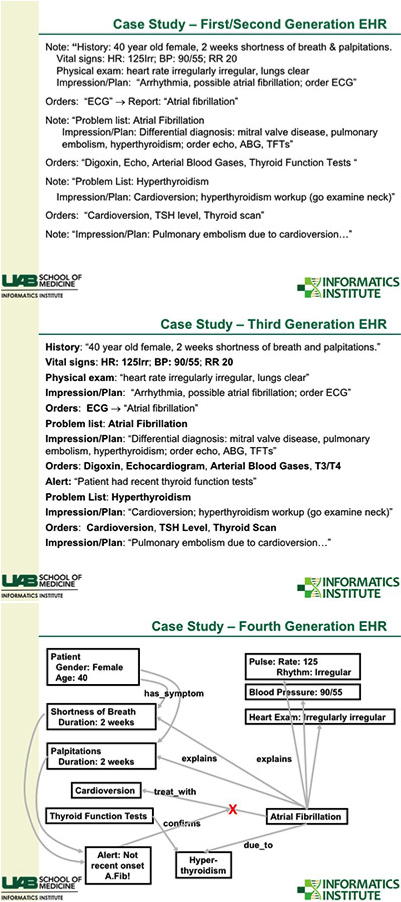
Dr. James J. Cimino, CCTS codirector of Informatics and director, UAB Informatics Institute, sketched out a vision for a next-generation electronic health record (EHR) in an invited seminar at Vanderbilt University’s Department of Biomedical Informatics this week. His talk reviewed what EHRs currently do right and wrong, highlighted their true potential, posted the missing link to achieving that potential, and described what is needed to support their evolution.
“EHRs have helped us improve billing, the legibility and availability of medical data, results reporting, order entry, alerts and reminders,” Cimino said. “Yet problems persist, including alert fatigue, redundant data capture, data overload (note bloat), incomplete data, and poor navigability.” Despite an early focus on EHRs as a tool to “guide and teach,” a la Dr. Lawrence L. Weed’s 1968 seminal article on medical records, they continue to fall short of their full potential.
EHRs could do a better job at minimizing annoyance, informing us about the patient, educating users, assisting with patient care, and supporting research, but they don’t. “So what’s the missing link?” he asked the audience.
The answer, according to Cimino, is “situational awareness,” a formal representation of symptoms, exam findings, interpretations, differential diagnoses, and other interrelationships that could help improve the impact of EHRs on patient outcomes. “What can we not afford to miss? What is ok to ignore?” he asked. He traced the differences between several generations of EHR development to underscore his point (see image).
The challenges to achieving this “intelligent assistant” version of the EHR “are not trivial and will require informatics, design, and educational solutions rolled out in tandem,” Cimino said. Steps to building it will be incremental, integrated, and will need to reach “critical mass.” But he painted a compelling picture of the benefits of such an effort: an EHR that would not only offer improved data capture, a better user interface, smarter alerts and reminders, and reduced redundancy, but also deliver a true learning health system capable of supporting just-in-time education for decision support.
Cimino concluded, “Representing situational awareness data will require fundamental informatics research, but I believe it can be done non-disruptively, so that we can evolve with our EHRs to a new era of health care. I'm looking for postdoc superstar researchers to help!"
Interested clinical informatics postdocs can reach Dr. Cimino via the Informatics Institute website.